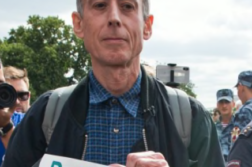Published in: January-February 2006 issue.
AFTER the major media success and publicity in 2000 of Rome World Pride, the group behind the event, InterPride (International Association of Lesbian, Gay, Bisexual, and Transgender Pride Coordinators), elected the organization Jerusalem Open House to organize a similar event entitled “Love Without Borders” in Jerusalem in August 2005. On May 14, 2005, however, Jerusalem Open House decided to cancel the parade. The organization announced that probable Israeli demonstrations against Prime Minister Ariel Sharon’s supposed pullout and dismantlement of Israeli settlements in occupied Gaza prompted them to move the parade to August 6–12, 2006.





